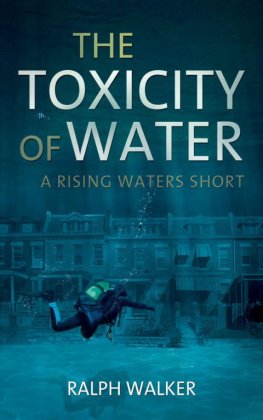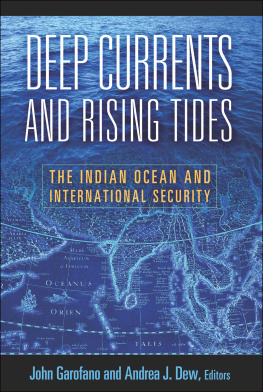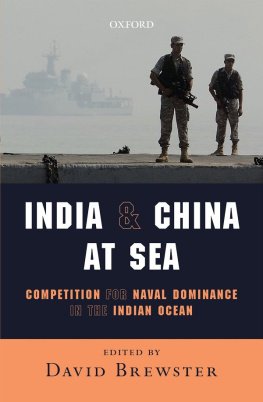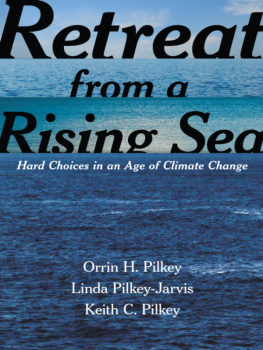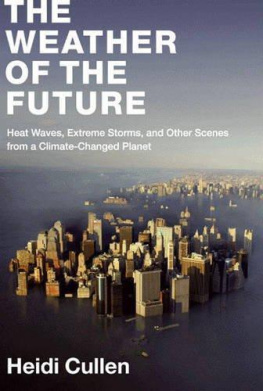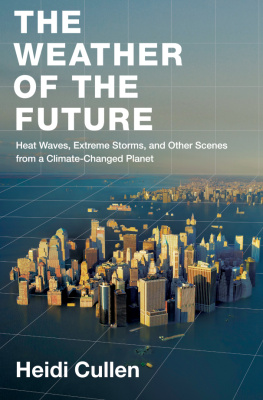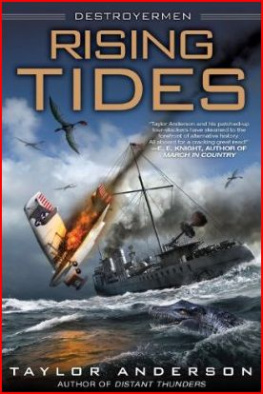RISING
TIDES
John R. Wennersten
and Denise Robbins
RISING
TIDES
Climate Refugees in the Twenty-First Century

This book is a publication of
Indiana University Press
Office of Scholarly Publishing
Herman B Wells Library 350
1320 East 10th Street
Bloomington, Indiana 47405 USA
iupress.indiana.edu
2017 by John R. Wennersten and Denise Robbins
All rights reserved
No part of this book may be reproduced or utilized in any form or by any means, electronic or mechanical, including photocopying and recording, or by any information storage and retrieval system, without permission in writing from the publisher. The Association of American University Presses Resolution on Permissions constitutes the only exception to this prohibition.
The paper used in this publication meets the minimum requirements of the American National Standard for Information SciencesPermanence of Paper for Printed Library Materials, ANSI Z39.481992.
Manufactured in the United States of America
Cataloging information is available from the Library of Congress.
ISBN 978-0-253-02593-7 (cloth)
ISBN 978-0-253-02588-3 (pbk.)
ISBN 978-0-253-02592-0 (e-bk.)
1 2 3 4 5 22 21 20 19 18 17
This book is dedicated to my wife, Ruth Ellen,
and our global family
John R. Wennersten
To my mother
Denise Robbins
CONTENTS
PREFACE
Climate change has been on the public radar for years, thanks in part to documentaries and news reports like Al Gores An Inconvenient Truth. The most crucial element of this problem, however, extends far beyond the natural environment; it affects all of the people on this earth. There is little public concern about the people who will be displaced and cast asunder on the planet as the result of climate change. In developed countries many do not see climate refugees as a pressing issue; others see climate change and refugee populations through the national lens of homophobia and nativism. The fate of the polar bear in an age of global climate change generates more public concern than the fate of millions of lives.
In writing this book we have sought to offer a critical survey of climate refugees in the twenty-first century and to discuss the problematic and hopeful aspects of the issue. The most difficult problems in the future will be not only getting the public to accept climate change as a rationale for massive population displacements but also to convince governments to thoroughly address the issue. The world has a moral duty to protect those who are forced to flee, whether by war, famine, or climate change.
Global climate change and global refugee crises will soon become inextricably interlinked. The climate is changing and the pace of that change has been increasing at rates that have startled geophysicists, demographers, and the general scientific community. A new tsunami of climate refugees flows across the earth. We are now at the moment of truth.
RISING
TIDES
PART ONE
Climate Refugees in the Twenty-First Century
Introduction
The issue of environmental refugees is fast becoming prominent in the global arena. Indeed it promises to rank as one of the foremost human crises of our times.
Norman Myers, Environmental Exodus
THE MAN IN THE TUNNEL
On August 6, 2015, a misty gray day, an illegal migrant was arrested in Britain after he had walked the entire thirty-one-mile length of the English Channel Tunnel. His name was Abdul Tahman Haroun, a forty-year-old Sudanese illegal immigrant who walked the tunnel to Britain from Calais, France. He was charged with malicious obstruction to a railroad carriageway. The fact that he succeeded in walking under the channel to Folkstone, England, underscores the desperation of people like him fleeing the impoverished dry lands of Sudan. On that same date there were at least five hundred other attempts to reach Britain from Calais through the tunnel. The net effect of this development has been that Britain has posted one hundred more guards in the Eurotunnel terminal and announced new measures to deter asylum seekers, with possible prison sentences of up to five years.
The tunnel is part of a larger issue of the number of people illegally trying to get into Europe from the Middle East and North Africa. Because of war and worsening environmental conditions, a constant flow of humanity is coming across into Europe, and there is no sign that it will be slowing down. Whether attempted by tunnel entry or in boats, which frequently capsize in the Mediterranean, this migration is part of humanitys distress call.
Climate change is with us and we need to think about the next big, disturbing ideathe potentially disastrous consequences of massive numbers of environmental refugees at large on the planet. As early as 1990 the Intergovernmental Panel on Climate Change reported that the greatest single impact of climate change could be on human migration with millions of people displaced by shoreline erosion, coastal flooding, and agricultural disruption, writes the United Nations Development Program in its 2015 Human Development Report.
THE RESEARCH OF CAMILO MORA
University of Hawaii biogeographer Camilo Mora and colleagues have recently published a disturbing analysis of what lies in the global future.
What scares Mora as a scientist and as an earth dweller is that changes are already happening around the world and that people cant appreciate the magnitude of these changes until it is too late, but when we start damaging physical systems and the carrying capacity of physical systems to produce food, people will react to this in a terrible way.
Most potential climate change consequences are described are in terms of weather extremes such as heat waves, floods, and severe storms. If we can extrapolate Moras data well into the future, we can anticipate greater and more damaging tropical storms and extreme heat waves that will transform moderate climate zones in the hemispheres into tropical environments or deserts. According to a data analysis published by the US Climate Change Science Program, there have been three distinct periods in the twentieth century in which the average number of tropical storms increased and then continued at elevated levels. The level of tropical storms globewide remained relatively stable until the close of the century, but in the ten-year period from 1995 to 2005, the number of extreme cyclones and hurricanes increased from an average of ten to fifteen: eight hurricanes and seven tropical storms.
With increased temperatures comes increased capacity of the atmosphere to hold moisture, resulting in heavier rainstorms. An increase in the intensity of floods in low-lying areas would be catastrophic around the world. In Bangladesh, for example, over seventeen million people live in elevations of less than three feet above sea level, and millions inhabit the flood plains and flat banks in the subcontinent along the Ganges and Brahmaputra rivers.
Environmental factors are almost invariably linked with economic factors in the push and pull of everyday existence. In developing countries it is the impoverished who often bear the brunt of the most environmental damage, which in turn sets off migration events. Because people often become climate refugees as the result of multi-causal factors, it is not easy to quantify their displacement as a social science problem. But it should also be recognized that sometimes environmental decline has nothing to do with political economy. As Norman Myers has pointed out, Not all factors can be quantified in comprehensive detail, nor can all analyses be supported with across-the-board documentation. If future changes in the climate continue to force mass levels of migration, it raises the question of when these victims will be granted rights to a form of protection.
Next page

